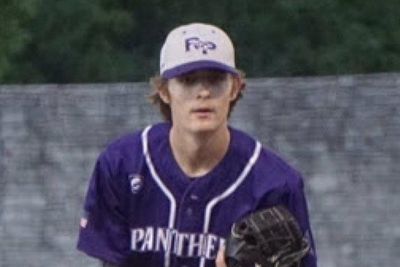Ridge Point’s Gradisar dominating postseason after Tommy John surgery
Kellen Gradisar is happy to be pitching again. It’s been a long time coming.
The Ridge Point junior right-hander had his sophomore season washed out after blowing out his elbow in the first inning of the first game of the season. Gradisar lasted just six pitches, with no soreness or warning.
“Initially, he was disappointed,” coach Clint Welch said. “He’s a competitor, and here we are in the first tournament of the year, and he goes down.”
On March 10, 2021, Gradisar was told he would need to undergo Tommy John surgery. Ten days later, he underwent the procedure that repairs a torn ulnar collateral ligament inside the elbow.
From there, Gradisar relied on his determination, work ethic and desire.
Rehabbing with physical trainers three days every week, Gradisar somehow worked his way back onto the field in 10 months. He was cleared to play around the time the Panthers started preseason practices in late January.
Little by little this season, Gradisar has methodically worked his way back. And now, in these playoffs, he has emerged as arguably Ridge Point’s No. 1 arm heading into this week’s Class 6A state semifinal against Southlake Carroll on Friday.
Gradisar, who doesn’t expect to be at complete full health until November, has been exceptionally dominant in the postseason, going 5-0 with an 0.82 ERA and 18 strikeouts to five walks over 34 innings. He has been Ridge Point’s Game 1 starter in the last three playoff series.
“It’s been amazing,” Welch said. “They get better and better at the surgery and with the rehab, as far as the medical side. It seems like the recovery time for the ones who work hard, and Kellen is one of those, seems to be shortening a bit for a lot of these guys. Late in the season, he’s been throwing well, throwing complete games, and has not wanted to come out.”
Gradisar has thrown at least six innings in every playoff start. Four of his five starts are complete games.
Sixty-five percent of his pitches have gone for strikes. Over the last three starts, he’s allowed just two earned runs.
“I definitely give credit to Coach Welch and (assistant) Coach (Michael) Dutka for their pitch decisions, as well as me being able to throw first-pitch strikes,” Gradisar said.
Gradisar has three primary pitches: fastball, curveball, changeup. He can throw any of them consistently for strikes. His best pitch is his curveball, and he can throw it any time in the count to keep hitters off balance.
His fastball tops out at 87 miles per hour.
“I feel like the recovery got me stronger, and just the fact I am able to pitch again gives me confidence to be better,” Gradisar said. “I’m already a better pitcher now, but, because of surgery, I lost a lot of weight and I’m still trying to get it back. I’m hoping by the end of summer, I’m close to full potential.”
Gradisar was under a strict pitch count when he returned to the field this season.
During the opening tournament, coaches tried to keep him around 30-40 pitches. The next week, it went up by 10 as his arm continued to show improvement.
Through much of district play, Welch and Dutka kept him under 60 pitches. During the postseason, Gradisar’s total number of pitches by start have been 89, 99, 100, 92, 93.
He averages about 14 pitches thrown per inning.
“He’s pitching efficient,” Welch said. “Going into his sophomore year, we had him penciled in as at least the No. 2 starter. He could always execute and throw three different pitches consistently for strikes. When you can do that, you can get people out at any level.
“What we’re seeing this year is what we thought we were going to get last year. We always had a high opinion of him.”
First-pitch strikes and trusting his defense is Gradisar’s recipe for a successful return. He commends the athleticism and speed of outfielders Carter Groen, Mason Dossett and Owen Farris. He applauds infielders Travis Vlasek, Zion Stephens, Parker Martin and Justin Vossos for their playmaking and aggressiveness.
Gradisar said catcher JJ Kennett has been crucial because of his poise and pitch framing ability.
“We have a lot of talent on the bump, but it helps as a pitcher knowing you can trust your defense when the other team hits it,” Gradisar said.
For his part, Welch praises Gradisar. Not only in his prolific pitch repertoire, but in how he is always unflappable on the mound. Never rushed, never panicked.
“Great composure,” Welch said.
Gradisar knows what it’s like to battle and fight, to push and prod. He knows adversity well.
He’s overcoming it well, too.
“You know when you get that surgery that it’ll probably be at least a year before you’re back,” Welch said. “But he did what competitors do. He got over the disappointment, started looking forward, got focused, got the surgery done, knew exactly what he had to do for rehab and followed all the protocols. It was no surprise to us that he was back within the year timeframe because of the work ethic that he has. It’s been incredible.”
